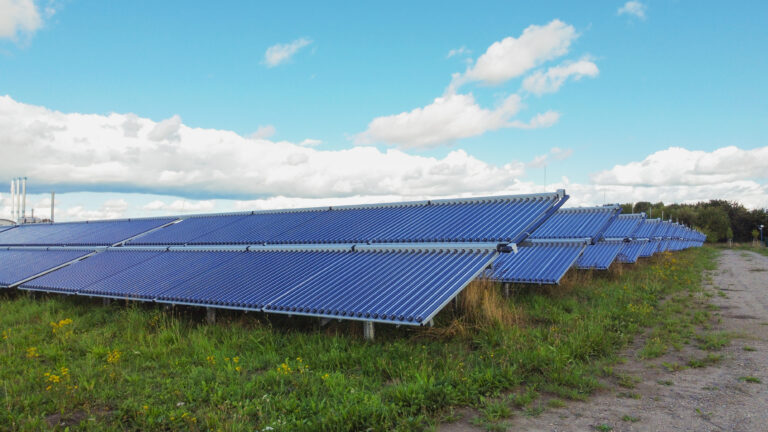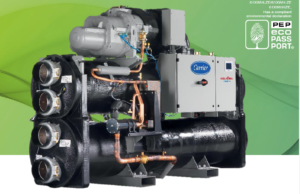Guaranteed yields are standard for new solar district heating plants in Germany
October 19, 2023
Solar thermal energy is still unknown territory for many district heating companies. Contractually guaranteed solar heat yields from the turnkey provider of the collector field are therefore the rule and mitigate the risk for the investor. We spoke with Christoph Bühler, Division Manager at the German SDH plant designer Ritter XL Solar, about the contractual arrangements of such guaranteed yields and the entrepreneurial risk involved for the turnkey collector field providers.
Photo: Ritter XL Solar
In Germany, more and more district heating companies are investing in large-scale solar thermal plants in order to increase the share of renewable energies in their district heating mix. In this context, it is common for suppliers of large turnkey solar thermal plants to guarantee minimum yields from the plant, and these are contractually agreed. “As a rule, there is such a contractual agreement for all ground-mounted systems,” said Bühler. In order to be able to stipulate guaranteed heat yields contractually, a certain minimum plant size is required, he explained. “For ourselves, we have set a limit of about 1,000 m² in order to justify the effort involved.”
To determine the guaranteed yield, the solar thermal providers use simulations to calculate what solar yield the respective system will achieve under the given framework conditions for the district heating network. They then subtract a safety margin from the expected yield. This results in the guaranteed yield. The amount deducted depends on the project and also on the penalty agreement, but it is usually within a range of 5 to 15 % of annual solar yield, said Bühler.
Guaranteed yield depends on real solar irradiation
This guaranteed yield is not a fixed value in Ritter XL’s heat supply contracts with its customers, but varies with the solar irradiation. If the real solar irradiation is lower than the irradiation on which the simulation is based, the guaranteed yield also reduces. “For this purpose, we have developed a tool tailored to our technology that uses a special calculation key to determine the yield reduction depending on the radiation reduction,” said Bühler. This reduced yield is also contractually secured.
There are no specific deductions from the guaranteed yield for maintenance or repairs. Especially since maintenance does not result in a loss of yield. However, the guaranteed yield contracts usually regulate the availability of the system, which means that repairs are also covered. However, yield losses due to repairs are the exception, as such large solar thermal plants have redundant duplicates of important components.
This September was exceptionally mild and summery in Germany. This has implications for district heating operators. An operator from southern Germany complained to solarthermalworld.org that there was hardly any heat demand in September, so not all the solar heat could be used. However, such climatic effects, which are expected to increase in the future as a result of climate change, are not taken into account in the simulation calculations for the guaranteed yields.
Guaranteed yields are a component of tenders
For district heating companies, the guaranteed yields of their large-scale solar thermal plants are an important value. The guaranteed values are often part of the tenders and the amount plays a central role in the selection of the turnkey supplier. They are also relevant in connection with national subsidies. In Germany, for example, there is a special subsidy for innovative combined heat and power (iKWK). In order to receive this subsidy, a minimum share of renewable heat must be achieved according to the Combined Heat and Power Act. Therefore, the guaranteed yields are a helpful factor in plant dimensioning to prevent undersizing of the combined heat and power plant.
Penalties for lower yields
Solar district heating plants are generally subject to precise, constant monitoring. Therefore, the district heating companies can easily verify compliance with the guaranteed yields. As a rule, turnkey suppliers guarantee the yields for a period of five years. However, this can also vary in individual cases. If the guaranteed yield is not met, a penalty payment is agreed, which is payable for each missing megawatt hour.
Despite safety reductions, there is always the possibility for solar thermal providers that the systems will deliver lower yields. “There is no such thing as a technical plant without risk”, said Bühler. “However, the risk is very low. To date, this case has not occurred with any of our plants.”
Websites of organizations mentioned in this news article:


